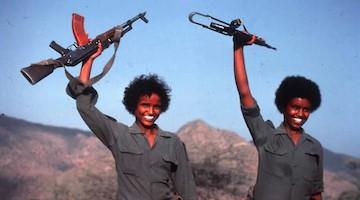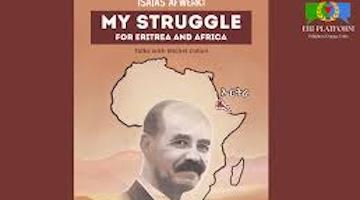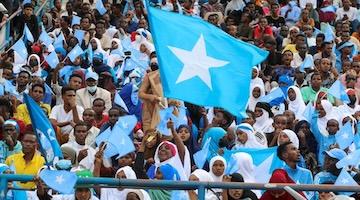Dr. Samson Abay Asmerom, pediatrician, and Dr. Eden Tareke, medical research scientist and professor, at the Mendefera Referral Hospital in Eritrea’s Southern Region. Health care is free in Eritrea.
Contributing Editor Ann Garrison continues her reporting from the Horn of Africa.
Upon arriving in Eritrea, I tuned out all the Eritrea haters screaming that it doesn't practice multi-party political democracy. This very limited form of democracy hasn’t saved the West from oligarchy, mass homelessness, mass incarceration, or perpetual war and aggression against peoples of the Global South, including Eritreans, so it’s obviously not the pinnacle of global civilization. If Eritreans or other peoples of the world choose multi-party democracy, fine, but the US/NATO shouldn't be trying to ram it down their throats with sanctions or using it as an excuse to bomb them into submission.
I came to learn about what the Eritrean government is doing to: 1) uplift its population—70% or more of whom are subsistence farmers, 2) maintain its fierce independence from the dominant world powers, and 3) achieve its goal of national self-reliance. I have in no way disguised that I’ve been here as a guest of the Eritrean government, and I would not have come as such if I did not already have a good opinion of its achievements and aspirations. I recommend “Eritrean Journey, Photos and Texts by Robert Papstein” to anyone reading this.
Eritrea rewrites the African mining script
Most African resource extraction leases are robbery with a cut for the kleptocrats who sign them. It’s not uncommon for a mining company to promise an African nation as little as 5%, then lie about how much ore, oil, or gas they’re actually extracting or find some other way not to leave even 5%. The impoverished people of Chad, for example, have gotten all but nothing for the oil moving through Exxon-Mobil’s Chad Cameroon Pipeline, and their people have received no training or technology that might enable them to build a domestic oil industry.
For decades the Congolese people have been robbed of the immense mineral resources smuggled out of their Eastern provinces by the US-backed armies and militias of Rwanda and Uganda, and this plunder is now being institutionalized with the collaboration of Congolese President Félix Tshisikedi, Rwandan President Paul Kagame, and Ugandan President Yoweri Museveni—all infamous kleptocrats.
I know these stories are more than familiar to most Black Agenda Report readers, so instead of citing more, I’ll move on to what Eritrea is doing to start rewriting the script. I had several long conversations about this with Economic Affairs Officer Hagos Ghebrehiwet, Minister of Information Yemene Meskel, and Milena Bereket, the government consultant who helped me schedule meetings and plan trips to see what most interested me in Eritrea. Milena worked on the Social and Environmental Impact Assessment for the Bisha Mining Project, which is now producing gold, silver, copper, and zinc.
They told me that all the mining resources in the country belong to the people and that the government is responsible to develop them on behalf of the people. I later confirmed these principles in the 2006 Eritrean National Mining Corporation Establishment Proclamation published in the Gazette of Eritrean Laws.
Do I believe that this is real, not a cover for the usual kleptocracy? I have no reason to believe that I was talking to kleptocrats or anyone covering for them. These are people who dress modestly, drive modest—even beat-up—cars and work in modest offices. I didn’t see any trappings of lavish lifestyles and in fact, didn’t see any evidence of gross wealth and income inequality in Asmara, the capital, where I spent my time when I was not in the countryside. The Minister of Information tells me that Eritrea’s Gini index of income inequality is 8%—extremely low. I can’t confirm this because the World Bank reports that there’s no data available for Eritrea’s Gini, but what I saw in the streets and the countryside suggests that he’s correct.
The nation shrugged at recent U.S. sanctions imposing foreign asset freezes on military and government officials because, they said, they didn’t have any.
Mining contracts
The mining contracts that my hosts tell me Eritrea demands are more just than any I’ve heard of in Africa. The mining company gets a 60% share while the government gets a 40% share and then collects a 34% capital gains tax. In the potash mine now in development, the government’s share is 50%. Given that Eritrea sits within the mineral-rich Arabian-Nubian Shield, these contracts have the potential to raise great amounts of money that can then be ploughed into the country’s development goals, including health, education, infrastructure and food security. Health care and education are already free and grains are the only agricultural commodity that the country imports.
Revenue from just mining contracts could no doubt build many more of the dams and ponds that are part of the Ministry of Agriculture’s national irrigation plan. The Ministry’s motto is “not one drop of rain should fail to irrigate, and not one drop should erode the soil.”
Mining revenue could also provide many of the Minimum Integrated Household Agricultural Packages that the government is trying to provide to small farm households to help them sustain themselves and produce enough surplus to feed four other families: 1 in-calf dairy heifer or 6 milking sheep or goats, 25 backyard chickens, 2 bee hives, 5 kilograms of vegetable, forage, and cereal seeds, and 20 tree seedlings. Total cost per package: $4000/USD.
I was able to confirm the 60/40% split at the Bisha gold/silver/copper/zinc mine in a January 2012 article in the journal Mining Technology.
However, U.S. resistance to the implementation of the Bisha mining project was not recounted there. My hosts explained that when Nevsun Resources—the Canadian firm that developed and, for some time, operated the Bisha Mining Project—sought financing from a German bank, the U.S. intervened diplomatically to discourage it, and then a Chinese firm stepped in to provide financing instead. Ultimately, Zijin Mining Group Co. Ltd, a Chinese-based multinational traded on the Hong Kong Stock Exchange, bought the majority of Nevsun Resources.
COVID-19 stopped, thus far, without mass vaccination
The Minister of Information, who also sits on the national COVID task force, told me that they are not ideologically opposed to mass vaccination, but they've seen no need to institute it so long as their preventive measures—including testing at air borders, quarantine at porous land borders, social distancing, and closure of public facilities for the first six months of the pandemic—continue to be extraordinarily successful. These measures have kept infections to 9,734 cases and deaths to 103, in a population of 3.6 million. That's 28 deaths per million population, compared to, e.g., 3,062 per million in the U.S.
Much of the reason for this success is no doubt that Eritrea's population is somewhere between 70 and 80% rural and there aren't large numbers of people traveling in and out of the country.
Despite its low COVID infection and death rate, the country has been excoriated for not instituting mass COVID vaccination—despite the fact that they've used vaccination, especially childhood vaccination, to achieve extraordinary success in stopping communicable diseases. They were the first African nation to achieve the UN’s Millenium Development Goals regarding health.
Eritrea does not practice the death penalty
Unlike the US, which loves to hate on Eritrea and claims vast moral superiority, Eritrea does not practice the death penalty. According to the World Coalition Against the Death Penalty, the last known state execution there was in 1989. In October 2016, it voted in support of the most recent UN General Assembly resolution on a death penalty moratorium.
Ann Garrison is a Black Agenda Report Contributing Editor based in the San Francisco Bay Area. In 2014, she received the Victoire Ingabire Umuhoza Democracy and Peace Prize for her reporting on conflict in the African Great Lakes region. She can be reached at ann(at)anngarrison.com.



















